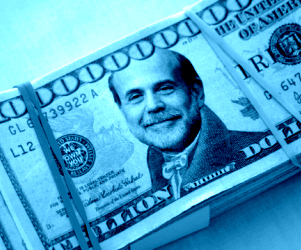What do you think?
 Some experts point to Barney Frank as the cause of the subprime mortgage which turned into a full fledged housing crisis which has played a massive role in exploding the U.S. economy while other experts point to house flippers yet others point to the Fed for their holding rates down, putting the economy at risk.
Some experts point to Barney Frank as the cause of the subprime mortgage which turned into a full fledged housing crisis which has played a massive role in exploding the U.S. economy while other experts point to house flippers yet others point to the Fed for their holding rates down, putting the economy at risk.
Regardless of where you stand, hindsight is 20/20, right? Today, Ben Bernanke spoke to the American Economic Association and noted that at the time, the low interest rates were “appropriate” and defends what steps they took at the time (which implies that the Fed’s hands are clean when it comes to the crash).
Bernanke’s closing is telling in that he notes that caution and flexibility are key:
“That said, having experienced the damage that asset price bubbles can cause, we must be especially vigilant in ensuring that the recent experiences are not repeated. All efforts should be made to strengthen our regulatory system to prevent a recurrence of the crisis, and to cushion the effects if another crisis occurs. However, if adequate reforms are not made, or if they are made but prove insufficient to prevent dangerous buildups of financial risks, we must remain open to using monetary policy as a supplementary tool for addressing those risks–proceeding cautiously and always keeping in mind the inherent difficulties of that approach. Clearly, we still have much to learn about how best to make monetary policy and to meet threats to financial stability in this new era. Maintaining flexibility and an open mind will be essential for successful policy making as we feel our way forward.”
Are you buying it? Did the Fed play a role or are their hands clean and the blame is to be placed elsewhere? 2010 will be the year of the “you caused the economic crash” blame game, this should be interesting to watch.
Lani is the COO and News Director at The American Genius, has co-authored a book, co-founded BASHH, Austin Digital Jobs, Remote Digital Jobs, and is a seasoned business writer and editorialist with a penchant for the irreverent.













































Benn Rosales
January 4, 2010 at 10:03 am
To sit back and blame the fed is to completely ignore every pundit on television and in the financial world telegraph their next moves in hopes of keeping rates the same or dropping a percentage point. During those years I’ve only ever heard complaints if he raised or kept rates the same when most were suggesting a move downward. The problem we faced is still buried in the incentive to borrow regardless of worthiness and a failure to verify worthiness on top of inflated housing prices. I’m not sure how in the hell you blame the fed when everyone was at the dinner table on this one.
BawldGuy
January 4, 2010 at 11:10 am
Go further down that road, Benn. The Fed is a handy whipping boy for those who used the alphabet soup of Wall Street created collateralized instruments. If they’d been regulated by those charged with oversight, where would we be today? IMHO, we’d be in the recovery from a normal down cycle.
The massive debt wouldn’t have been possible — WS would’ve been headed off at the pass before the damage could’ve been done. Alas, we can now only hope to have learned the lesson previous dozens of generations before us have: If your regulators ain’t showin’ up for work, everyone pays the price.
Benn Rosales
January 4, 2010 at 11:35 am
But Jeff, more regulation would have meant not enough dinner to go around, come on, now! Pass the gravy!
BawldGuy
January 4, 2010 at 12:17 pm
The perfect rejoinder. 🙂
The point on which we surely agree, when it comes to regulation: We don’t want more, we want the rules in force to, you know, be enforced. That and not allowing banks to be investment houses in any way shape or form.
An example of existing laws going without enforcement is illegal immigration, especially in the western states. We all know what would end it overnight. A 30 day grace period to allow employers to purge their labor force of illegals. This would be followed by random, unannounced inspections. Illegals would be taken away and deported. Employers would have a choice, pay a heavy fine, or close their doors for a specified time period.
How long do ya think the hiring of illegals would continue?
Brandie Young
January 5, 2010 at 9:49 pm
Call me obtuse, but I never did understanding collateralizing a depreciating asset …